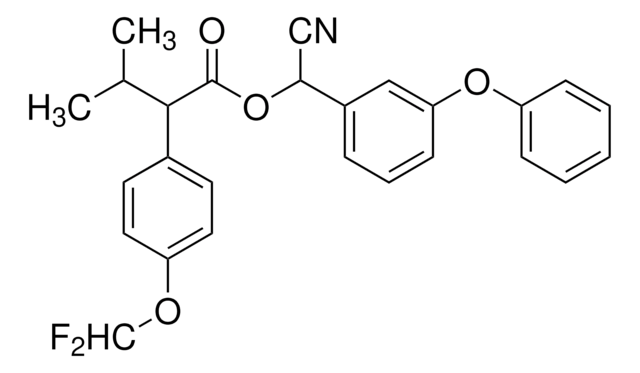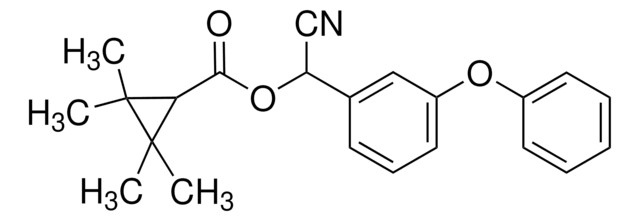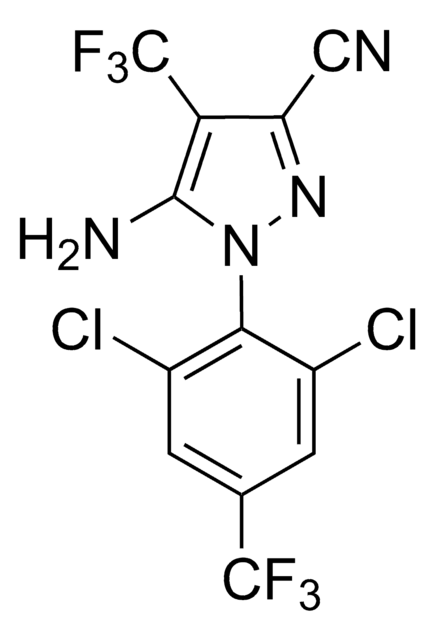CRM68471
Flucythrinate
certified reference material, TraceCERT®, Manufactured by: Sigma-Aldrich Production GmbH, Switzerland
Synonym(s):
α-Cyano-3-phenoxybenzyl 4-difluoromethoxy-α-isopropylphenylacetate
About This Item
Recommended Products
grade
certified reference material
TraceCERT®
Quality Level
product line
TraceCERT®
shelf life
limited shelf life, expiry date on the label
manufacturer/tradename
Manufactured by: Sigma-Aldrich Production GmbH, Switzerland
storage temp.
2-8°C
SMILES string
CC(C)C(C(=O)OC(C#N)c1cccc(Oc2ccccc2)c1)c3ccc(OC(F)F)cc3
InChI
1S/C26H23F2NO4/c1-17(2)24(18-11-13-21(14-12-18)32-26(27)28)25(30)33-23(16-29)19-7-6-10-22(15-19)31-20-8-4-3-5-9-20/h3-15,17,23-24,26H,1-2H3
InChI key
GBIHOLCMZGAKNG-UHFFFAOYSA-N
Looking for similar products? Visit Product Comparison Guide
General description
Certified content by quantitative NMR incl. uncertainty and expiry date are given on the certificate.
Download your certificate at: http://www.sigma-aldrich.com
Flucythrinate is a synthetic a-cyano pyrethroid insecticide that acts as a voltage gated sodium channel agonist. It finds its use to provide protection against a variety of sucking insects, beetles, and lepidoptera in cotton and pome fruits.
Flucythrinate is not approved for its use in the European Union (EU) as per the Commission Regulation (EC) No 2076/2002 of 20th November 2002 as a plant protection agent under the Regulation (EC) No. 1107/2009, repealing the directive 91/414/EEC. Flucythrinate is measured and reported along with other mixtures of its constituent isomers (sum of isomers). But a default maximum residue limit (MRL) of 0.01 mg/kg and 0.02 mg/kg is applicable for its presence in fresh/frozen fruits and tree nuts respectively according to Reg. (EU) 2015/868.
Application
The methiocarb CRM may also find use as given below:
- Development of a class selective enzyme-linked immunosorbent assay (ELISA) to screen a-cyano pyrethroids and their metabolites
- Comparison between two sample preparation techniques-dispersive liquid-liquid microextraction (DLLME) and QuEChERS-DLLME, followed by gas chromatography-electron capture detection (GC-ECD) for the determination of 10 pyrethroids from different fruit juice samples
- Multi-residue analysis of 133 pesticide residues in chenpi samples using a modified QuEChERS method and gas chromatography-tandem mass spectrometry (GC-MS/MS)
- Simultaneous determination of 78 pesticides in black tea samples using multi-walled carbon nanotubes (MWCNTs) for dispersive solid phase extraction (d-SPE) accompanied by quantification with gas chromatography-tandem mass spectrometry (GC-MS/MS)
- Development of a method based on gas chromatography-mass spectrometry (GC-MS) in negative chemical ionization mode to determine 17 pyrethroid residues in garlic, onion, spring onion, and chili samples
- Development and validation of a method for multi-residue analysis of 124 pesticides in rice samples using modified QuEChERS extraction and gas chromatography-tandem mass spectrometry (GC-MS/MS)
Legal Information
Signal Word
Danger
Hazard Statements
Precautionary Statements
Hazard Classifications
Acute Tox. 3 Oral - Acute Tox. 4 Inhalation - Aquatic Acute 1 - Aquatic Chronic 1 - Flam. Liq. 3
Storage Class Code
3 - Flammable liquids
WGK
WGK 3
Flash Point(F)
113.0 °F
Flash Point(C)
45 °C
Choose from one of the most recent versions:
Certificates of Analysis (COA)
Don't see the Right Version?
If you require a particular version, you can look up a specific certificate by the Lot or Batch number.
Already Own This Product?
Find documentation for the products that you have recently purchased in the Document Library.
Our team of scientists has experience in all areas of research including Life Science, Material Science, Chemical Synthesis, Chromatography, Analytical and many others.
Contact Technical Service











